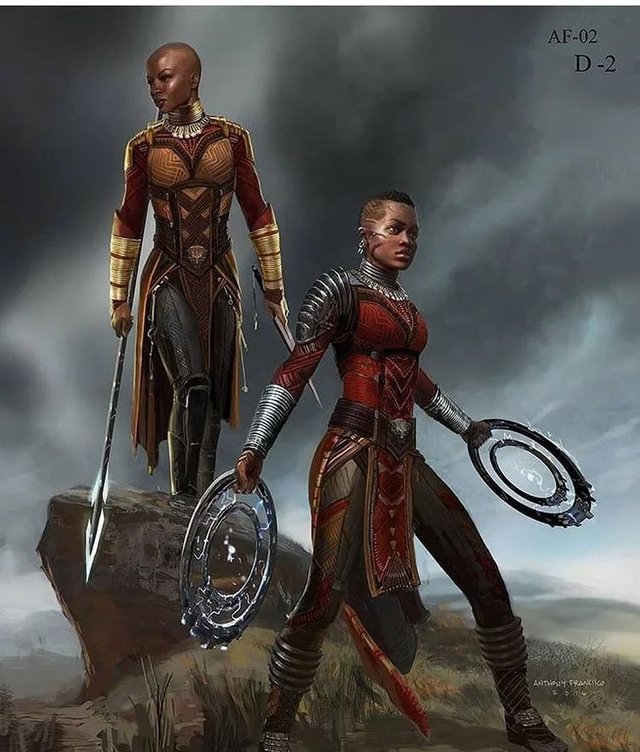Black Panther Review

I’m going to spare you all yet another glowing Black Panther review (it rocked, go see it in theaters if you can, 5/5 Woobies all the way) because I want to talk about something else: the most relevant debate in the film applies directly to all service members and government employees.
It goes down been General Okoye of the Dora Milaje (Danai Gurira) and Nakia, a “war dog” or spy for the Wakandan nation (Lupita Nyong’o).
SPOILER ALERT

After Killmonger claims the Wakandan throne in a brutal but legal trial by combat against T’Challa, Nakia immediately takes charge of ensuring that T’Challa’s mother and sister can escape before Killmonger executes them.
As Nakia is preparing to leave, she is frustrated by Okoye’s decision to stay behind and remain in her role as the general of the Dora Milaje, now serving as Killmonger’s special forces body guards. They face an ideological impasse: when a person in power begins acting in a way that is (maybe) legal but potentially damaging to the health and welfare of others or the nation, what is the best way to address the problem?
By acting against the system – remember, Killmonger was installed according to their laws and traditions, it was not an unlawful power grab – you risk undermining the system and damaging it beyond repair. By acting within the system and supporting the ruler/decision maker, you risk propping up a dictator and/or war criminal.
Okoye is a traditionalist and expresses that she stays for love of her country. Nakia is a spy, used to acting outside the boundaries of law or tradition, and believes she is showing her love of country by remaining loyal to the presumed dead T’Challa.
Both women present good arguments and neither is really wrong. Okoye believes she can not only protect the institution, but by remaining in place she can perhaps prevent Killmonger from going too far. Nakia not only bears the responsibility of protecting T’Challa’s living family, but also has the geopolitical experience to understand that this may require acting outside the law.
Their ideological gap also extends to the film’s central conflict of whether or not it’s right for Wakanda to remain isolationist. However, for the US veteran audience, I think the other question is the most relevant: what do government servants do when their leadership crosses the line?
Veterans are taught to stand up to unlawful orders, but not only is that a difficult task for even the most self-assured among us, it’s also stymied by the entire concept of legality. Once seated on the throne, Killmonger immediately begins dismantling the Wakandan traditions Okoye is fighting to uphold, and he also begins an aggressive imperialist policy by preparing to declare war on the world. These are fundamentally anti-Wakandan decisions and hold neither moral nor ethical weight, however, they are legal in the most literal sense of the word. Depending on who wins the war, refusing these orders could still amount to treason.
Standing up to an unlawful order comes at great personal and professional risk. If the existing power structure remains in power and disagrees with your assessment that the order was unlawful, you have just committed treason or a mutiny. When you’re right, you’re Warrant Officer Hugh Thompson, Jr., and you’ve just put a stop to the My Lai Massacre. When you’re wrong, you’re Chelsea Manning.
Black Panther has the benefit of being a film and as such, neither Okoye nor Nakia are actually wrong. Because Okoye and Nakia are both right, they both take action that ultimately facilitates T’Challa’s return to power. The answer to the question they posed was to each act according to their own consciences and act out of a loyalty to the greater good.
Sadly the real world is seldom that tidy and satisfying. When the US ambassador to Panama quit, he said “I signed an oath to serve faithfully the President and his administration in an apolitical fashion, even when I might not agree with certain policies. My instructors made clear that if I believed I could not do that, I would be honor bound to resign. That time has come.” He hasn’t been alone in a spate of resignations by career Federal service professionals.
These are, by and large, people with 20 years or more of service under their belts whose resignations didn’t come lightly or at the behest of partisan politics. It would be impossible to accuse some of these people with 30 years of service under their belts of quitting simply because their party of choice isn’t currently in a position of authority. They’ve been there through all the ups and downs, power shifts and dynasty evolutions. These are actions driven by conscience. Will that allow any of these people to be in a position to take more productive positive action as Nakia did? Only time will tell.
Black Panther’s answer to this dilemma is optimistic but surprisingly sound: make the best decision you can based on your conscience and the available information.
And really, isn’t that all anyone can do?